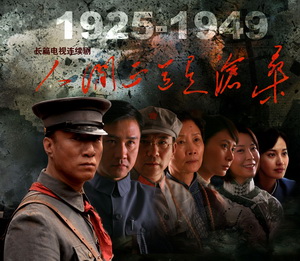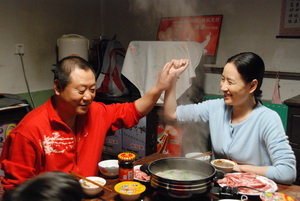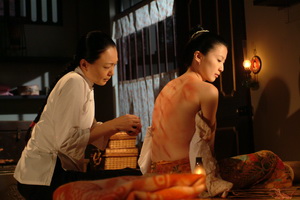TV series in Competition
My Brother Name Shun Liu (China)
This TV series is set against the backdrop of China’s war against Japan, led by Su Bei New Fourth Army. It tells a legendary war story with the elements of reality, humour and sadness. One was the commander of New Fourth Army who terrified the enemies. Another was a sharpshooter from the mountainous area. They became good friends thanks to a bullet. Owing to Shun Liu’s outstanding shooting skills, the rash young fellow was appreciated by Chen Dalei and through his help, grew into a brave and excellent sniper, with numerous exploits. However, in one sniping mission, an accident totally changed his fate… The series successfully shortens the distance between history and the present time, turning this heroic story into a memoir and legend for the audience. The images of the heroes are etched on the audience’s minds.
A Beautiful Daughter-in-Law Era (China)
When beautiful nurse Mao Doudou has a blind date with young photographer Yu Wei, she actually meets her first lover Li Reqiu. So the date ends unhappily. Coincidentally, she and Yu Wei meet on several blind dates after that. Finally, she is deeply moved by the story behind the dates of Yu Wei, and decides to get along with him. But the complex family of Yu Wei makes DouDou feel awkward. After they marry, they have to live together with Yu Wei’s sister Yu Hao who was widowed soon after her wedding. Though Yu Hao always provokes her newly-wed brother and sister-in-law, Doudou still forgives her. But the jealous quarrels of two mothers-in-law always make Doudou feel awkward.

Yang Li ren, Yang’s eldest son, was a high ranking officer of the Nationalist Party. Yang Liqing, the youngest son, was a senior officer of the Communist Party. The two brothers represent different ideologies. Their father, Yang Tinghe, was neutral, and stuck to the traditional idea of “home and country” of China and never wanted to go to Taiwan. Through the different paths of the Yang siblings’ lives from 1925 to 1949, this TV series combines the fates of individuals and a nation, and delicately integrates a significant theme, vivid characters and various stories. It unfolds before us a magnificent political and historical scene from Nationalist-Communist cooperation in the Huangpu Period to the Nationalists defeat by the Communists, and their flight to Taiwan. It shows the historical inevitability of the Communist Party taking the place of Nationalist Party and establishing the new China. It passes on a positive theme: to Chinese people, blood is thicker than water, and harmony and sovereignty are what they long for. This is an excellent television work with ideological content and artistic quality.
Brother’s Happiness (China)

The honest and kind-hearted Foo Chi Hsiang is used to living a simple and happy life in a small town of Northeast China. His younger brothers and sisters who think themselves having a successful career and happy life now try their best to arrange for their elder brother a job in Beijing. They want to help him to live in a completely different way. But the material wealth they pursued is not really what Chi Hsiang wants. He cannot get used to life in such a big city. A series of ridiculous things happen, which make people finally realise what exactly is the simple happiness that everyone pursues. By introducing the interaction of the different lifestyles , living conditions, and attitudes towards life of these five brothers and sisters, this TV play shows us present-day Chinese urban people’s real life among different social classes. Thus it explores and interprets what real happiness is and how to pursue it from a philosophical view.
Time Story (Taiwan,China )
In 1965, Chen Xiou-Hao a local Taiwanese young woman meets her husband Sun Yu-Chang who is an old soldier from China. No matter that they speak different languages; but, they fall in love at their first meeting at an out-door movie, get married, and raise three children. This couple lives in a big village where all residents come from different places in China. During that period, the Taiwanese economy was fast growing. This drama contains family, neighbourhood, and friendship love stories.
Shahukou (China)
In a small town in northwest China reclamation is the route to the Central Plains region.
In 1942, a group of secret weapons donated by patriotic overseas Chinese to the main base of war for the Eighth Army, disappear when they are passing through shahukou. The headquarters of the Eighth Army had sent a detachment to find the weapons, but they never came back. The head ,against all the odds, had no alternative but to send the new soldiers. The Japanese troops in Shahukou were hit severely, the Japanese officer was very angry and sent the cruel commander Haneda to deal with local anti-Japanese forces. Bai Lang led his troops in camouflage to deal with the enemy. They misled the Japanese troops into the hinterland of the Taihang Mountains, and launched a severe battle.
Dwelling Narrowness (China)
Su Chun and Guo Haiping were a loving couple. They lived in an alley for they lack money to buy an apartment in Jiangzhou. Saving enough money for the down payment was Haiping’s biggest dream. After graduation, Haizao, Haiping’s young sister, stayed together with her boyfriend Xiao Bei. They also felt the hardship of buying a house. Thanks to the work relationship, Haizao met the mayor’s secretary, Song Siming, who liked her at the first sight. Song helped Haizao and Haiping overcome many difficulties. To repay his goodness, Haiping had an affair with him. At last, Haiping’s family moved into a new house through their own efforts. Just as everything was about to turn better, Song was involved with a murder of official. Though the series was shot in Shanghai, its meaning goes beyond regional boundaries, reflecting the psychologies of workers from other places, local people, successful men and housewives. It shows the confusion everybody faces when striving for owning “a nutshell of a house”.
Black and White (Taiwan,China)
Chen Zaitian, a cop good at cracking cases, applied to transfer to another part of the city. There, he met his impetuous new partner Wu Yingxiong, who was then investigating the crime of drug “dreamer”. Wu dislikes Chen for his frivolous behaviour. During the investigation, they came across the daughter of the San Lian Gang’s leader, Chen Lin. The three soon became friends. Once chasing criminals, Chen Zaitian saved Chen Lin, who mistakenly regarded Wu as her saviour. But after several unexpected experiences, Chen Lin fell in love with Zaitian, while Zaitian always avoided her. This series hides darkness in brightness, without the usually sombre style of cops and robbers movies. The intrinsic emotion and complicated case brings mixed feelings of paradise and hell.
Luo Gu Lane (China)
\'One treasure, two generations, three families’ grievances, forty years’ history’. The story began in the Qing Dynasty: a lot of national treasures were stolen, which not only affected the government, but also changed the fates of three official families. The whole story is about the “golden jade,” family hatred, national interests and love entanglements of a forty year long story.
A Beautiful Woman in the North (China)

A precarious age, an old town, an unsurpassed beauty of a generation, a mean foster mother, a period of emotional entanglement, a weepy familial affection without blood relationship, a legendary story about troubled times and beauty, troubled feelings and encouragement…
The story of the life of low society in an old town, this drama tells about the life and death of various people, imagining the historic changes of the whole society. It is really a picture scroll of society and history with many meanings.
Who Will Call the Shots of My Youth (China)

This is a story about three young girl cousins. They were not content with their parents’ plans for them. They want to follow their hearts. Zhao Qingchu had to make a choice between sense and sensibility; Qin Xiaoyang paid a bitter price for the pursuit of unique character and freedom. But is she really wrong? Li Pili struggled hard to escape the pattern designed by her mother, and to become independent. One grandma with wisdom, three mothers strongly holding onto realism, and three post-80s girls full of dreams. The clashes of the different outlooks on life of the three generations audiences of the same ages sympathetic. Besides that, there are distinctive languages and a rebellious modern quality. This has made this optimistic teen TV series popular among youngsters.
Little Nyonya (Singaore)

Ju-xiang, born in a Peranakan family, is the concubine\'s daughter. She is gentle and beautiful. Since childhood, she began to learn cooking and needlework from her mother. Born deaf, she is discriminated against. Before the Japanese troops went southward, she was arranged to marry a rich Babas as concubine. Ju-xiang was against the arrangement and fled the forced marriage. Later she met a young Japanese photographer. Through some twists and turns, the two married, and gave birth to their daughter Yue Niang. During the turbulent era, she was tortured. Her husband and she died, leaving only the 8-year-old Yue Niang.
Yue Niang moved back to her grandparents. Under the supervision of her grandmother, Yue Niang learned traditional Nyonya cooking, needlework and grew up just like her mother. After the war, her grandfather who had fled to Britain returned, and Yue Niang, just as her mother had been, was discriminated against. She was beaten and tortured.
Yue Niang’s beauty attracted the jealousy of her cousins, and also the attention of rich Babas’s son and the British officers, but she only liked a "penniless" Steven Chen, a small driver.
Under pressure, Chen Hsi was forced to marry the cousin of Yue Niang. And Yue Niang was sold to butcher. Yue Niang was unwilling to follow others. She began learning to do business. In the process, she was framed, but she overcame all of the troubles and finally succeeded.



